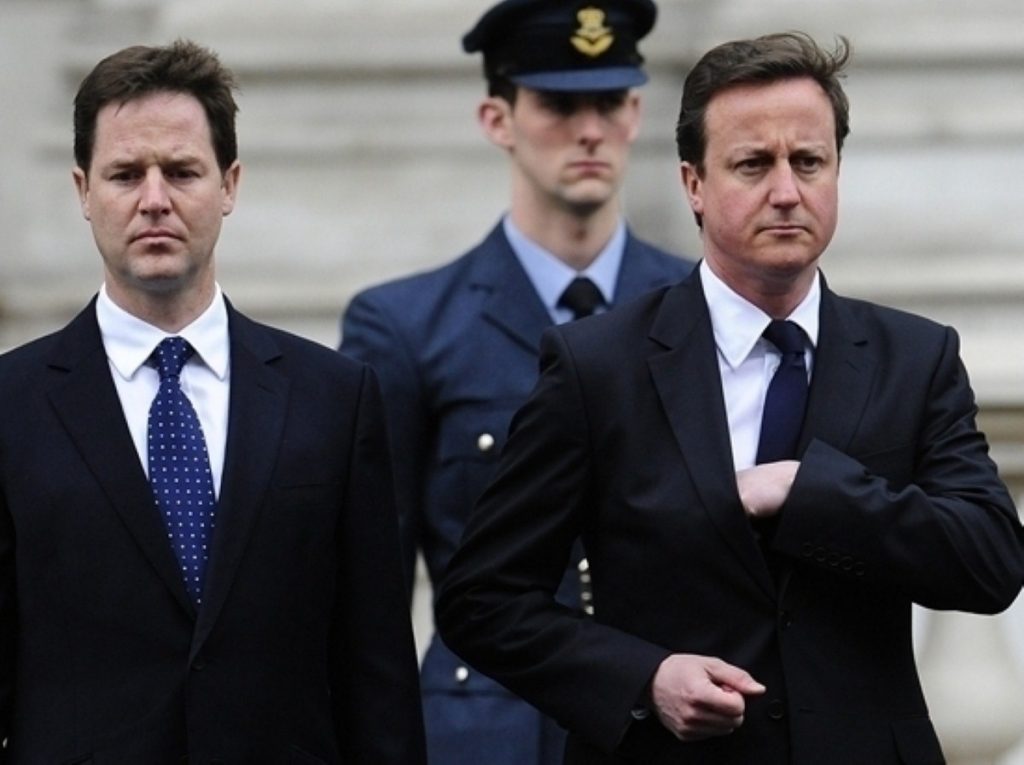Cameron wants ‘fresh consent’ over Europe
By Ian Dunt Follow @IanDunt and Alex Stevenson Follow @alex__stevenson
David Cameron has insisted ruling out a referendum on Britain's continued links with Europe would be a mistake.
The prime minister is facing a tough session of questioning in the Commons as he updates the House on the European Union's council of ministers summit last week.
He faced question after question from Tory backbenchers on the EU referendum issue.


Mark Pritchard called for a referendum in this parliament because the EU was changing "fundamentally".
Conor Burns complained the British public is "heartily sick of broken promises on referendums".
Anne Main suggested that the eurozone crisis was a moment of opportunity for Britain, as many European countries were in a position of weakness.
"Now is the right time to have a debate with them about which powers to bring back before we have any kind of referendum," she urged.
A weekend of uncertainty over Cameron's position was resolved yesterday with a newspaper article in which the Tory leader said he could see a case for holding a referendum – but that he would prefer a renegotiation of Britain's relationship with the EU.
This afternoon Cameron told MPs that Britain's priorities over Europe were to deal with "instability and chaos" before taking opportunities for the UK "to shape its relationship with Europe".
He added: "Far from ruling out a referendum for the future, as a fresh deal in Europe comes clear we should consider how best to get the fresh consent of the British people."
Labour leader Ed Miliband attacked the prime minister's changing position on the issue of a referendum in recent days.
"First it was no, then it as yes, then it was maybe," he said.
"It's nothing to do with the national interest – it's all about managing the divisions in
a nudge nudge wink wink European policy is neither good for the country nor will it keep his party quiet."
Cameron replied: "He likes to tell us endlessly about standing up to vested interests, but the fact is he will never stand up to two big vested interests – the trade unions and Brussels."
Cameron's pledge to hold a referendum on the EU appears to have galvanised rather than placated his backbenchers, amid signs he may be unable to hold back the demands of eurosceptics.
Liam Fox, who stepped down as defence secretary after he was discovered to be running a shadow foreign policy unit in his department, made a speech this morning calling for an in-or-out poll rather than the more moderate set of options muted by the prime minister.
"I would like to see Britain negotiate a new relationship on the basis that, if we achieved it and our future relationship was economic rather than political, we would advocate acceptance in a referendum of this new dynamic," he said.
"If, on the other hand, others would not accede to our requests for a rebalancing in the light of the response to the euro crisis, then we would recommend rejection and potential departure from the EU."
The speech came as eurosceptics showed increased confidence in the wake of the Cameron pledge.
"The case for a referendum is growing by the day," John Baron, the Tory MP who organised a letter demanding a referendum to Mr Cameron, told politics.co.uk last week.
"David Cameron could stand up tomorrow and say we'll put it in our manifesto pledge.
"I don't think people will believe that – too many promise have been broken. That is the value of putting it on the statute book, that people know for sure that, unless the next prime minister repeals it, it will take place."
From the other side of the debate, business secretary Vince Cable branded the idea of a referendum during the current crisis "horribly irrelevant".
Speaking to the BBC's Sunday Politics yesterday, Ukip leader Nigel Farage said no-one would believe Cameron's promises after his pre-election pledge of a referendum in the case of further transfer of powers.
"All he's done here is to give some sort of vague promise that there might be a referendum in the future, but that it will not be about our membership of the European Union," Farage said.
"If he thinks by doing that that he's shot Ukip's fox and he's buried this issue in the long grass, he's in for another think."
Mr Cameron suggested over the weekend he might hold a referendum in the next parliament if he won a majority, but he would not countenance a full in-or-out vote.
Instead, Britain would vote on aspects of the ERU it would back away from – such as its legal, social or employment rules.
Experts are uncertain quite how such a vote would take place. If Britain was able to repatriate powers it could then ask the public to vote on what the government had already done, although that would be a strange and counter-intuitive approach to take.
If the public voted before negotiations, it would be uncertain whether Britain could secure the changes.

